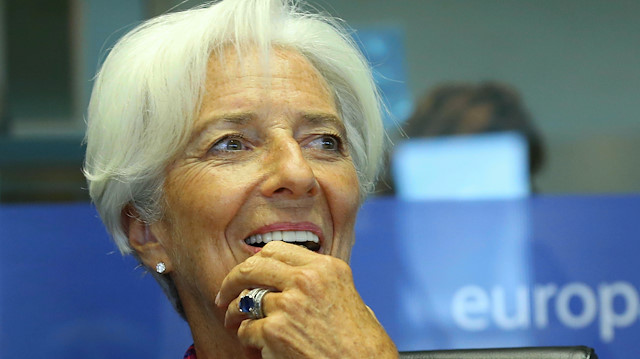
As the European Parliament has approved the nomination of Christine Lagarde to serve an eight-year term as the next president of the European Central Bank (ECB), the new role will test her leadership in governing the global economics.
Born on Jan. 1, 1956 in Paris, Lagarde holds a law degree from the Paris Nanterre University and a master's degree from the Political Science Institute in Aix en Provence.
The rock star of international finance, so to say, was a member of the French national synchronized swimming team when she was a teenager.
Lagarde speaks French, English and Spanish fluently.
She is the mother of two sons.
- Career occupied by leadership positions
In 2011, Lagarde was elected to become the first-ever female head of the International Monetary Fund (IMF).
Forbes, a well-known American business magazine, ranked her the third most powerful woman and the 22nd most powerful person in the world in 2018.
Lagarde, a lawyer by background, practiced her profession for 20 years with the international law firm Baker McKenzie, of which she became the global chairman in 1999.
In 2005, she joined the French government as a trade secretary. Two years later, she became the first woman to hold the post of finance and economy minister of a G7 country.
When France took over the presidency of G20 in 2011, she developed a wide-ranging agenda on the reform of the international monetary system as the chairwoman.
During her career in the IMF, she addressed problems having emerged in the aftermath of the global financial crisis in 2008, the eurozone debt crisis and international trade disputes to resolve.
Lagarde always put an effort to rebuild the IMF's credibility, although she failed in some cases. For instance, Greece's 2010 bailout and the IMF's biggest bailout, a $57 billion deal for Argentina last year, were seen controversial decisions.
The problems and her way of dealing with them made her frequently rank among the top 10 most powerful women globally.
- Concerns over Lagarde's nomination for ECB head
When asked whether she considers running to head the ECB, she answered "no, no, no," though she later described her nomination as "an honor."
Lagarde resigned as the head of the IMF last week and she is now set to succeed Mario Draghi on Nov. 1 as the president of the bank.
Since she lacks experience in governing a central bank, many economists raised concerns over her future role at the ECB.
Lagarde's new position is considered important regarding the changing missions of the central banks across the globe, especially after the 2008 global financial crisis, focusing on strategic communication and coordination with all other economic institutions rather than implementing strict monetary policies.
Although she may not seem the best option for the ECB by background, she has various skills hard to ignore: an international reputation and a great understanding of diplomacy.
- Finance industry needs ‘ethics upgrade’
In her articles, Lagarde frequently asserted that a healthy economy requires a healthy financial sector and yet there is a deeply felt sense of unease over the role of finance in today’s world.
According to her, policymakers are still internalizing the lessons learnt from the last crisis, but they need to be vigilant about new risks.
She lately raised awareness for cyber attacks, which could potentially lead to losses in net income in the global banking system.
Also, Lagarde suggested that the financial industry needs an “ethics upgrade,” which is what she briefly explains for financial professionals: "This simply means doing the right thing, even when nobody is watching."














